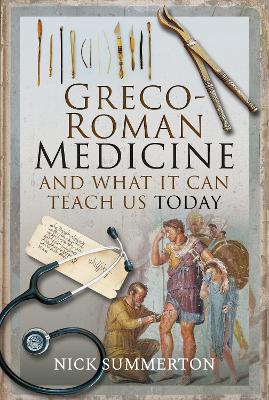Reviewed by annieb123 on
Greco-Roman Medicine and What It Can Teach Us Today is a historical retrospective on the medical arts in the ancient world with correlations to modern medical practise by Dr. Nick Summerton. Released 23rd Dec 2021 by Pen & Sword, it's 208 pages and is available in hardcover and ebook formats.
I'm always a bit skeptical of books drawing medical and scientific relevance from "the wisdom of the ancient world". They're usually full of "woo woo" and generally woefully mistaken in substance and factual content. That being said, however, this is a well written, no-nonsense treatise about precisely that, written by a physician who is still currently in practise and, quite refreshingly, "woo free" on the whole.
The author is quite adamant about distancing himself from adopting ancient methods wholesale (sheep urine as mouthwash for example), but he insists (correctly) that maintaining a healthy work/life balance, minimising chronic stress, and maintaining a healthy lifestyle with regular exercise, fresh air, and clean nutritious foods will contribute a great deal to longevity and overall quality of life.
The book is peppered with quotes from period Greek and Roman sources writing lucidly and competently about health and wellness. It's easy for modern readers to forget that scientists in ancient times certainly weren't less intelligent or reasoning (for the most part) but that they lacked the scientific basis which has developed in the intervening centuries and which we take for granted.
As a student, I had 7 years of Latin study as part of my curriculum. I remember having an epiphany at one point that there were many surprisingly modern successfully performed medical procedures in Rome, such as cataract surgery, which if not precisely common, were not unheard of.
This book is generally split into a retrospective history of Greco-Roman medicine and a more expository look at the potential relevance for historical practices to be adopted for modern use. The history chapters are well annotated and very interesting. The modern chapters are much more expository and less precise.
The book also includes photos and facsimile drawings of many period historical sites and medical implements. I found the plates and annotations fascinating and informative. Many are reproduced in colour and add a lot to the read. The bibliography is extensive and will provide readers with many hours of further reading, following up references.
Four stars. Recommended for fans of ancient history, and medical history.
Disclosure: I received an ARC at no cost from the author/publisher for review purposes.
Reading updates
- Started reading
- 3 January, 2022: Finished reading
- 3 January, 2022: Reviewed
